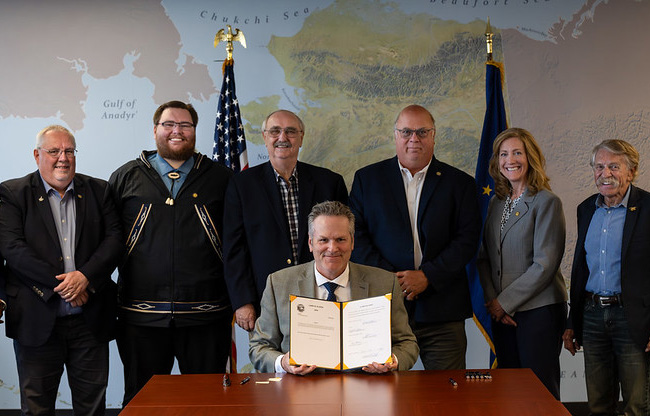Mike Dunleavy, the governor of the U.S. state of Alaska, has once again vetoed a bill funding the Alaska Seafood Marketing Institute (ASMI).
ASMI, which works to promote Alaska seafood, is supported by state funding, but Dunleavy used a line-item veto in the state’s 2025 budget bill to deny it USD 10 million (EUR 9.2 million) on 4 July. Dunleavy indicated he may seek to restore the funding via a supplemental budget bill if ASMI submits a detailed spending plan.
“The Dunleavy administration has offered support of supplemental funding next session once ASMI has developed a comprehensive marketing plan,” Jeff Turner, the governor’s communications director, told the Alaska Beacon.
In 2022, Dunleavy, a Republican who has clashed at times with the state’s seafood industry, particularly in his backing of the proposed Pebble Mine, vetoed USD 5 million (EUR 4.6 million) in ASMI funding, saying the agency had already received USD 7 million (EUR 6.5 million) in federal Covid-19 relief funds.
“After a thorough review of the agency’s funding, it was determined that the USD 5 million wasn’t needed this fiscal year for ASMI to promote and advertise Alaska seafood,” Turner told Alaska Public Media at the time. “All the funds that were vetoed from the FY23 budget will be deposited in the state’s rainy day fund: the Constitutional Budget Reserve account.”
Dunleavy approved USD 5 million in funding for ASMI in the 2024 budget; prior to that, ASMI had not received any state funding since 2018. ASMI had USD 20.9 million (EUR 19.3 million) in funding in FY 2023, including USD 6.7 million (EUR 6.2 million) in federal funding and USD 14.2 million (EUR 13.1 million) in statutory designated program receipts, or funding received from the seafood industry. It expects to receive USD 13 million (EUR 12 million) in federal funding and USD 16.2 million (EUR 15 million) from industry fees in 2024.
ASMI Executive Director Jeremy Woodrow said while opportunities for Alaska seafood have opened up domestically since U.S. President Joe Biden banned all Russian seafood from entering the country, the organization backs the governor’s decision.
“We support the governor’s budget, one way or another,” he said.
Woodrow said ASMI, which in recent years has launched the Alaska Seafood Online Marketplace, co-sponsored marketing initiatives in Japan and the U.S., and introduced an Asian marketing push, will submit an updated plan to the governor containing more details on its domestic marketing plan.
United Fishermen of Alaska Executive Director Tracy Welch called Dunleavy’s veto a “missed opportunity."
“The industry needs help now – not two years from now,” Welch said.
Welch said Alaska’s seafood industry is currently facing a crisis, though she said ASMI has shown the ability to “get creative” with a smaller budget.
“ASMI has operated on a shoestring budget for quite a few years, so they do a lot with what they’re given; I have confidence that they’ll do as best they can,” Welch said.
Alaska Senate President Gary Stevens (R-Kodiak) disagreed with Dunleavy’s decision.
“The governor is always saying that we want to tell the world that we are open for business, but nothing says we’re closed for business more than cutting these funds from ASMI,” Stevens said.
Stevens said while ASMI could get its funding restored in the next legislative session, any delay in the delivery of funds would be harmful to the state’s seafood industry.
“Waiting doesn’t help at all,” he said. “It’s a very short-sighted view of the industry. Now is the time to help it out, not to just delay things.”
Alaska seafood industry was valued at USD 6 billion (EUR 5.5 billion) in 2023, and it employs more than 48,000 workers statewide, according to an ASMI study.
In May, Alaska lawmakers voted to establish a seafood industry task force, an eight-member group that will recommend policy changes to the legislature that aim to aid the state’s commercial fishing industry.








